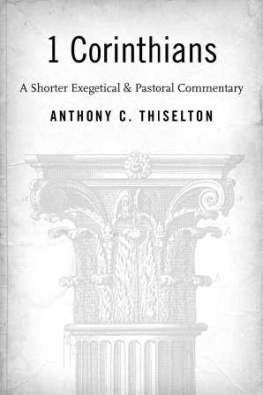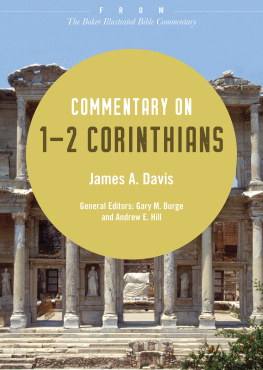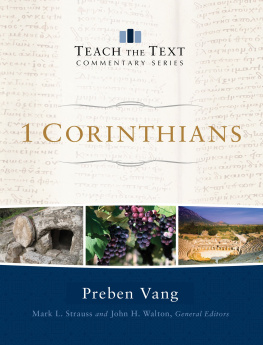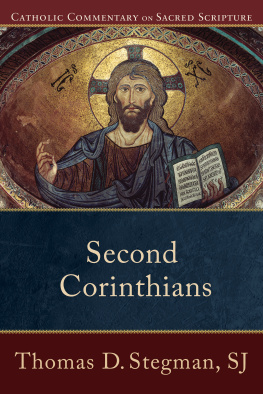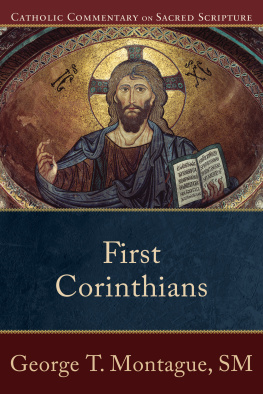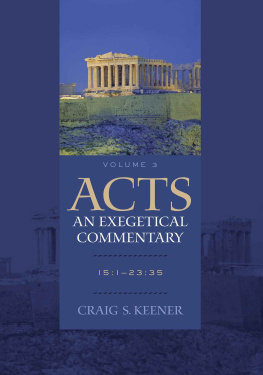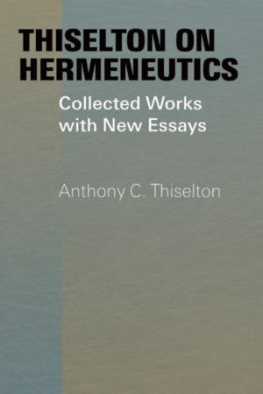Anthony C. Thiselton - 1 Corinthians: A Shorter Exegetical and Pastoral Commentary
Here you can read online Anthony C. Thiselton - 1 Corinthians: A Shorter Exegetical and Pastoral Commentary full text of the book (entire story) in english for free. Download pdf and epub, get meaning, cover and reviews about this ebook. year: 2008, genre: Religion. Description of the work, (preface) as well as reviews are available. Best literature library LitArk.com created for fans of good reading and offers a wide selection of genres:
Romance novel
Science fiction
Adventure
Detective
Science
History
Home and family
Prose
Art
Politics
Computer
Non-fiction
Religion
Business
Children
Humor
Choose a favorite category and find really read worthwhile books. Enjoy immersion in the world of imagination, feel the emotions of the characters or learn something new for yourself, make an fascinating discovery.
- Book:1 Corinthians: A Shorter Exegetical and Pastoral Commentary
- Author:
- Genre:
- Year:2008
- Rating:3 / 5
- Favourites:Add to favourites
- Your mark:
- 60
- 1
- 2
- 3
- 4
- 5
1 Corinthians: A Shorter Exegetical and Pastoral Commentary: summary, description and annotation
We offer to read an annotation, description, summary or preface (depends on what the author of the book "1 Corinthians: A Shorter Exegetical and Pastoral Commentary" wrote himself). If you haven't found the necessary information about the book — write in the comments, we will try to find it.
1 Corinthians: A Shorter Exegetical and Pastoral Commentary — read online for free the complete book (whole text) full work
Below is the text of the book, divided by pages. System saving the place of the last page read, allows you to conveniently read the book "1 Corinthians: A Shorter Exegetical and Pastoral Commentary" online for free, without having to search again every time where you left off. Put a bookmark, and you can go to the page where you finished reading at any time.
Font size:
Interval:
Bookmark:

Pastoral Commentary
Pastoral Commentary
Anthony C. Thiselton
xiii
i
This commentary is in no sense a mere summary or abbreviation of my earlier, longer commentary on the Greek text, which was published in December 2000. I have reflected on this epistle for five more years, and I have accorded priority here (i) to stating my own views rather than examining a variety of possible interpretations, and (2) to giving an even higher profile to how this epistle engages with pastoral and practical issues in the church and the world today.
The impetus for writing a second, shorter commentary on i Corinthians emerged at two levels, one serious and the other not-soserious. The latter arose from some banter with the Bishop of Truro, Bill Ind, a former colleague on the Church of England Doctrine Commission some twenty years ago. The Bishop collared me one day, two or three years ago, with the comment, "I saw you had written a commentary on i Corinthians. I thought, 'I'll buy that'. Then I noticed that the reviewer said, `On page 1,371....' Can't you write a commentary that's a sensible size?"
More seriously, while numerous scholars, theological teachers, and senior clergy have expressed very generous and warm appreciation of the longer commentary, many clergy, pastors, and leaders of church Bible study groups have spoken of the need for a shorter commentary that would (like the larger one) show pastoral as well as scholarly concern but make more allowance for the pressures of time that they face. Further, the Bible Society in the United Kingdom, who had generously assisted with funding for research for the larger commentary, also expressed their desire and hope for a work designed more directly to serve church life. The William B. Eerdmans Publishing Company also very generously warmed to the idea, on the condition that the shorter commentary would not merely replicate the larger one on a small scale. I have carefully honored this agreement.
I seldom had either my earlier commentary or any other open on my desk as I wrote this one. A lifetime of research on i Corinthians allowed me to simply "think" as I wrote. Needless to say, this work presupposes and builds upon these many years of research and reflection, but I have simply asked myself (i) what the text means; and (2) how it applies to pastoral and practical issues today. Some will recall that many other questions were brought to the larger commentary.
The exegetical or expository sections, printed in standard type, were relatively easy to write, although I have revised them and simplified their vocabulary three times. The difficult part was to write the fifty-two sections that follow each block of text and exegesis with "Suggestions for Possible Reflection" on the passage or section in question. These fifty-two sections appear in smaller print after the exegesis of each section.
"Possible" signals my hesitancy at so daunting a task, especially since "practical" comments are often either banal or wander too readily from the point of the passage. My first attempt was too "pious" and sermonic, verging too much on the hortatory. After all, the gospel is a celebration of transformative good news, not a catalogue of "how to do better." My second draft majored on formulating questions. But everyone knows the pitfalls here. Either they are so transparent that they are downright patronizing ("the answer is in v. 7"), or they are so opaque in their open-endedness that readers are uncertain how to address them.
After much anguish and many full wastebaskets, I undertook a third rewriting. I have tried to offer a mixture of reflections and questions designed to avoid the pitfalls mentioned above. "Possible" signals: "Who am I to say all this?" But I fervently pray that the "Reflection" sections will facilitate a practical and formative impact for thought and life today that genuinely arises from careful exegesis of the text. I hope that for some they even facilitate sermon preparation in a busy, pressured ministry. The early chapters have been road-tested in my parish church in outer Nottingham in Bible studies led by others.
The Introduction is selective. Its aim is to shed practical light on how the epistle as a whole is to be understood. With Schleiermacher I la ment that too often "Introductions" are dull and academic when they should fire a vision for reading the text. I hope that those who seek practical help will not ignore the Introduction. It is designed to transport readers into the "worlds" of Corinth and of Paul, and to explain why this church and this apostle think, feel, act, and write as they do. Hence in the Introduction I have included a map of the geographical situation of Corinth and seven photographs of remains of the ancient city.
I need to comment on the English translation from the Greek text that I use here. Among the many reviewers of my larger commentary, a number expressed particular appreciation for my English translation, which was entirely new or original. In this shorter commentary I have reproduced this translation except for some occasional minor rephrasing where my earlier attempt to be rigorous and accurate left an English phrase somewhat too cumbersome or clumsy. Bearing in mind a broader readership, I have smoothed the translation here and there. At only one point has it substantially affected the meaning. After I had completed my earlier commentary, Bruce Winter published his persuasive understanding of I2:3, which I have broadly adopted in my translation here. Occasionally I have called attention to small differences of wording.
Some of you may find the extensive Bibliography of Works Cited unduly intimidating. But I have cited only those authors whose work is so much a part of my thinking on a passage that it would suggest a lack of professional integrity not to acknowledge their influence. In the commentary itself I have used only very short, abbreviated titles with page references. The full publication data can be found in the Bibliography of Works Cited. I have included no book or article that I have not explicitly drawn on in the text. Thus if any major study has been omitted, this is not because I fail to value it but because I wanted to keep scholarly allusions to a minimum. If the book or article was published not later than 2000, it was almost certainly included in my larger commentary.
This commentary runs to barely one-sixth of the larger work in length, but since I have added many "Suggestions for Possible Reflection" the exposition or exegesis is considerably shorter, and, once again, different. The questions and agenda with which I have approached the text are not those that I had in mind when I wrote the longer commentary.
Finally, I acknowledge with grateful thanks the help of my wife Rosemary, who had long hoped that I would write a much shorter, practical commentary, even if it was based on work for the longer commentary. She arduously deciphered my handwriting to type it. This is my ninth book, and time away from the family is one unavoidable price I pay. I thank my family (which includes three children and five grandchildren to date) for their understanding. Mrs. Sheila Rees has also kindly and freely given her time in checking references and proofreading. I am deeply grateful to all who have encouraged me in this work, and I pray that it may help many who wrestle with this wonderful epistle to find new light for their way.
Font size:
Interval:
Bookmark:
Similar books «1 Corinthians: A Shorter Exegetical and Pastoral Commentary»
Look at similar books to 1 Corinthians: A Shorter Exegetical and Pastoral Commentary. We have selected literature similar in name and meaning in the hope of providing readers with more options to find new, interesting, not yet read works.
Discussion, reviews of the book 1 Corinthians: A Shorter Exegetical and Pastoral Commentary and just readers' own opinions. Leave your comments, write what you think about the work, its meaning or the main characters. Specify what exactly you liked and what you didn't like, and why you think so.

